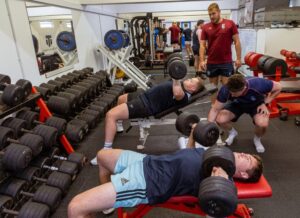Welcome to the Rugby Renegade Recovery Bible and I’m sure if you’ve ever played a game of rugby you’ll know about the wonderful soreness that you experience for a day, two days or longer after a physical game! Just as familiar will be the feeling of soreness you get after a heavy workout or when you try a type of training you are unfamiliar with. We have written this Recovery Bible to help rugby players everywhere get the education they need about recovery and some real world applied tips and strategies to get your body back on track in the shortest time possible. Recovery and getting it right is becoming an increasingly popular focus for teams. We’ve always held the opinion that you need to recover as well as you train and as well as you play. It’s great to see that these mainstream messages are getting a louder voice.

The Science of Recovery
Stress can occur in many different forms. Physical, mental, emotional and the human body is very well equipped to deal with short episodes of stress. Short periods of stress are actually extremely beneficial to us. They trigger positive adaptive processes that make us stronger. When we train in the gym our muscles adapt to be better able to deal with mechanical loads. When we suffer the right amount of mental stress at work (called eustress) we become motivated to overcome challenges and find solutions to problems. That experience stays with us and we develop more ability to deal with similar challenges in the future. It is when we don’t get the opportunity to adapt to stress and develop ourselves that we suffer from chronic stress. Chronic stress, unlike short episodes that we adapt from can quite literally be a killer.
In the modern world we find ourselves in high stress environments all the time. Long work days, connected to our devices 24/7 and full schedules drive us more and more towards a state of chronic stress. Recovery is the anti-dote to stress but it is one we often ignore, dismiss or delay to our detriment. Our warning lights come on but we have a tendency to ignore them until bigger problems force us to stop – either through ill health or mental burnout.
The human machine is made up of eleven systems that never act on their own. It is a complex interaction of all of the bodies systems. A change in one always leads to a domino effect of change in one or more of the other systems.
- Nervous system that contains all of the neurons (nerve cells) in the body, including the brain. The governor that has overriding control of all we do, think and feel. It is a system that can rapidly respond to any changes in our internal or external environment. It includes specialist cells that allow us to see, hear, feel, taste, and smell.
- Endocrine system. All of our hormones that respond to our world and cater for the longer term management of our internal environment.
- Musculoskeletal System (two systems in one, muscle and skeletal) all of the bones, muscles, ligaments and tendons that accept, redistribute and deliver mechanical forces from and to the world around us
- Cardiovascular. Our heart, blood vessels and the blood that runs within it delivering oxygen and nutrients to the cells of the body whilst getting rid of all of the waste products produced by the cells.
- Respiratory. The lungs and airways bringing oxygen in and getting rid of carbon dioxide and water
We also have;
- Integumentary system.
- Lymphatic system
- Digestive system
- Urinary System
- Reproductive
So why do we need to know about all of the systems in the body? We don’t ultimately but as we are looking at recovery it is important to know that inadequate recovery and chronic fatigue that will come as a result of poor recovery strategies has a negative influence on each and every one of the body systems described above.
At the top of the list is the magnificent nervous system that controls everything. To better understand stress we are going to introduce the systems within the system. The nervous system can be split into two distinct systems; the central nervous system that includes the brain and spinal chord, and the peripheral system. The peripheral nervous system contains the somatic nervous system that lies under the control of the conscious part of the brain and allows us to move our arms and legs etc, the enteric nervous system that looks after the function of our gut and digestive system, and finally the autonomic nervous system that looks after our subconscious functions and the work of our internal organs. The stuff that we constantly do like our heart beating and our blood vessels widening to deliver more blood to our muscles when we start exercising etc. is the work of the autonomic nervous system. Stress and recovery have a huge influence on the autonomic nervous system.
The autonomic system is split into two, the parasympathetic and sympathetic nervous systems. The sympathetic nervous system controls ‘fight and flight’ when the body is in a heightened or stressed state, and the parasympathetic nervous system controls the bodies systems of repair and recovery. The two systems act like they are on opposite sides of a seesaw. If one system is up (active) the other can only be down (suppressed). Internal and external stresses typically drive us into a state dominated by the sympathetic nervous system.
What happens when we are ‘stressed’?
Remember that stress can be applied to the body through many forms. But what ever the stressor is, the response is generally quite uniform and it centres on an upregulation or activation of the sympathetic nervous system and a down-regulation or suppression of the parasympathetic nervous system.
When our body becomes stressed it enters into the fight or flight system. Typical responses include;
- Increased heart rate to raise and blood pressure increases
- Blood sugar concentration is increased
- Immunity is surpressed
- Respiratory rate increases
- Blood vessels to muscles dilate (widen)
- Blood vessels to other organs constrict (narrow)
- Pupils dilate
- Digestion slows
All of these responses are designed to prepare an animal to escape whatever the perceived threat is and they can be maintained for a period of time but they are designed to be a short term measure, not active in the long term. These responses are controlled initially by the brain when it recognizes a threat and then by the endocrine system that releases hormones like adrenaline and very importantly cortisone in to the body.
Stress Hormones
Noradrenaline & Adrenaline
Noradreanline is released from the adrenal medulla of the adrenal gland found on top of the kineys and acts as a neurotransmitter and a hormone. In the brain it stimulates alertness, anxiety, arousal and focuses attention. In the body it increase blood pressure, heart rate, triggers the mobilization of glucose from stores and increases blood flow to muscles – preparing the body for action.
Adrenaline is also known as epinephrine and is also produced by the adrenal medulla. Adrenaline can also act as a hormone and neurotransmitter leading to similar responses to noradrenaline. Combined adrenaline and noradrenaline are responsible for the short term and immediate responses to stress. These two hormones are released and act immediatley
Cortisol
Takes longer to act than the hormones above, a matter of minutes rather than immediately. Cortisol is produced in the adrenal cortex on the outside of the adrenal glands rather than the medulla on the inside.
Cortisol acts in a number of ways around the body. It stimulates the release of glucose from cells elevating the amount of glucose in the blood so it is available to use by muscles in the fight or flight response. It can also lead to the break down of muscle tissue – especially if levels remain high for prolonged periods. Cortisol also suppresses the immune system.

Chronic stress can disturb every system in the body but it has an especially potent effect on the cardiovascular, immune, digestive, sleep and reproductive systems in the body. Other psychological effects of chronic stress include anxiety, depression, irritability, low mood, poor motivation and poor concentration.
The very real consequences of chronic stress include;
High blood sugar levels. This causes a number of negative impacts around the body. High blood sugar causes our body to store more fat
What happens when we relax?
When we relax there is a reversal of the stressed situation. We allow our sympathetic nervous systems to be down-regulated or suppressed and the parasympathetic nervous system becomes up-regulated or activated. Just as we can perceive stress from a number of sources, our parasympathetic system can be triggered by a number of conditions as well. And just like with stress, whatever trigger is causing the parasympathetic system to activate the body’s responses are similar from person to person.
Recovery Fundamentals
Recovery fundamentals are the essentials for optimal health, an optimal life and optimal performance. Without these fundamentals in place you will not train, live or perform at your best. Click on the bottons to find out more about each of your fundamentals
Hydration. You can only survive 3-4 days without water – you get your hydration wrong and you are in big trouble!
Sleep. It isn’t clear how long the human body can survive with out sleep but after 3-4 days you would probably start to hallucinate. Again it’s clear to see why we’re counting this as one of your fundamentals!
Nutrition fuels performance, it fuels recovery, it fuels life! You can’t afford to get it wrong
What is Optimal Recovery?
Its different for everybody but why not try out our recovery challenge and find your optimal recovery approach to keep you at your best





